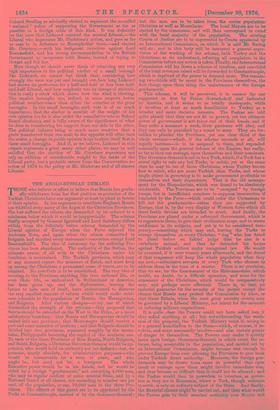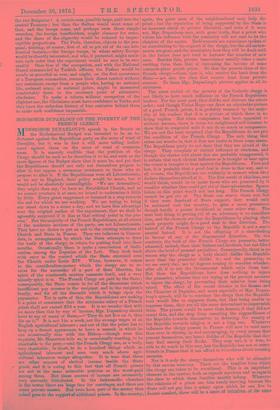THE ANGLO-RUSSIAN" DEMAND T HOSE who believe or affect to believe
that Russia has gradu- ally withdrawn from her first position as protector of the Turkish Christians have one argument at least to plead in favour of their opinion. In her eagerness to conciliate England, Russia has whittled away many of the hopes of the Christian Provinces. She has suffered the reform she demanded to be reduced to a minimum below which it would be inappreciable. The scheme finally accepted by General Ignatieff and Lord Salisbury differs widely from the infinitely better scheme demanded by the Liberal opinion of Europe when the Porte rejected the Andrassy Note, and again when the crimes committed in Bulgaria had shocked every statesman's conscience except Lord Beaconsfield's. The idea of autonomy for the suffering Pro- vinces has been abandoned. The authority of the Sultan, the ultimate source of all evils to the Christians under his dominion, is maintained. The Turkish garrisons, which may at any moment repeat the massacre of Batak, and must keep up among the Christians a permanent sense of terror, are to be retained. No new Code is to be established. The very idea of securing to the Provinces anything like true national life, or even State life, as understood in Switzerland or America, has been given up, and the diplomatists, leaving the future to take care of itself, have endeavoured to discover the very smallest amount of reform which would make exist- ence tolerable to the population of Bosnia, the Herzegovina, and Bulgaria. After various changes—every one of which diminished the strength of the reforms—they proposed that Servia should be extended on the West to the Drina, as a more satisfactory boundary ; that Bosnia and Herzegovina should be united into one province ; that Montenegro should receive a port and some accession of territory; and that Bulgaria should be divided into two provinces, separated roughly by the moun- tains, Philippopolis becoming the capital of the southern one. To each of the three Provinces of New Bosnia, North Bulgaria, and South Bulgaria, a Christian Governor-General would be ap- pointed, who would hold an authority not yet defined—but, we presume, nearly absolute, for administrative purposes—who would be irremovable for a term of years, and who might be, but need not be, a foreigner. The whole Executive power would be in his hands, and he would be aided by a foreign "gendarmerie," not exceeding 4,000 men, who may be regular soldiers of some neutral State, and by a National Guard of all classes, not exceeding in number one per cent. of the population, or say, 50,000 men in the three Pro- vinces. The officers of this guard are to be appointed by the Turks at Constantinople, instead of by the Governor-General ; but the men are to be taken from the entire population/ Christian as well as Mussulman. The local Mayors are to be elected by the communes, and will thus correspond in creed with the local majority of the population. The existing Courts of Justice are to be superseded by Courts appointed by an International Commission, on which it is said Mr. Baring will sit ; and to this body will be intrusted a general super- vision of the working of the scheme, both Turkey and the Christians, as we understand, referring all complaints to the Commission before any action is taken. Finally, the International Commission will lay down a scheme of taxation, and one-third of the total revenues raised will be forwarded to Constantinople, which is deprived of the power to demand more. The remain- ing two-thirds will be spent in the Provinces themselves, the first charge upon them being the maintenance of the foreign gendarmerie.
This scheme, it will be perceived, is in essence the one suggested at first by Prince Gortschakoff and indicated by Austria, and it seems to us totally inadequate, while it involves at least as much humiliation to Turkey as a broader and more decisive measure. The Pashas are told quite plainly that they are not fit to govern, yet the ultimate power of government is not taken out of their hands, and if they order a massacre a week, their garrisons will obey, and they can only be punished by a resort to arms. They are for- bidden to plunder the Provinces, yet one clear third of the whole revenue—which, if the scheme succeeds at all, will rapidly increase—is to be assigned to them, and expended nominally upon the general defence of the Empire, but really, so far as they can manage, upon themselves and their nominees. The Governor-General is not to be a Turk, which, if a Turk has a moral right to rule any but Turks, is unfair, yet at the same time he may be one of those Christians, whom Turkey knows how to select, who are more Turkish than Turks, and whose single object in governing is to make government profitable to themselves and their dependents. That is the old arrange- ment for the Hospodariats, which was found to be absolutely intolerable. The Provinces are to be " occupied " by foreign troops, but in insufficient numbers to suppress insurrection if fomented by the Porte—which could order the Cireassians to kill out the gendarmerie—unless they 'are supported by Europe, that is, by the very display of Western force which all these feeble devices are intended to avert. And finally, the Provinces are placed under a reformed Government, which is to regenerate them, to give their civilisation scope, and to create confidence in its subjects, and yet is to be considered tem- porary,—something which may end, leaving the Turks to avenge themselves on every Christian " dog " who has dared to plead before an Infidel judge that he also is a vertebrate animal, and that he defended his house against Turkish soldiers under recognised law. He would be executed, if it were twenty years afterwards, and the dread of that vengeance will keep the whole population what they are now,—submissive servants of every Turk who chooses to address them in the tone of a master. There is no provision, that we see, for the disarmament of the Mahommedans' which would, no doubt, be a difficult operation, and none for the armament of the Christians, which would be comparatively easy, and perhaps more effectual. There is, in fact, no material guarantee for the security of the people except the chance that Russia may protect the Commission by force, or that Great Britain, when the next great atrocity occurs, may be governed by a Liberal Ministry, not intent for the moment on reducing military expenditure.
It is quite clear the Powers could not have asked less, if they asked anything at all ; but notwithstanding the weak- ness of the proposal, the Turkish Ministry resist it, seeing in it a general humiliation to the State—which, of course, it in- volves, and must necessarily involve—and also certain points of danger to themselves. The Powers may under it quietly insist upon foreign Governors-General, in which event the re- forms, being acceptable to the population, and carried out by an International Commission, might become real enough to prevent Europe from ever allowing the Provinces to pass back under Turkish direct authority. Moreover, the foreign gen- darmerie may be drawn from races so powerful that open insult or outrage upon them might involve immediate war, and thus become so difficult that it could not be allowed ; and the Pashas would then be powerless to interfere, as power- less as they are in Roumania, where a Turk, though welcome to settle, is only an ordinary subject of the State. And finally, the financial clauses might be carried out, and then what would the Pashas gain by their nominal authority over Bosnia and the two Bulgarias ? A certain sum, possibly large, paid into the central Treasury ; but then the Sultan would want some of that, and the troops some, and perhaps even those simple wretches, the foreign bondholders, might clamour for some, and the share of the oligarchy would be reduced to imper- ceptible proportions. The Porte, therefore, objects to the pro- posal, desiring, of course, first of all to gat rid of its one sub- stantial feature,—the foreign troops, in whose safety Europe would be directly interested, and who, if protected, might main- tain such order that the experiment would be seen to be suc- cessful. Once free of the occupation, and with the National Guard commanded by Turkish officers, the Pashas would be nearly as powerful as ever, and might, on the first occurrence of a European commotion, resume their direct control without any resistance, except from a people who, having no national life, national army, or national police, might be massacred comfortably down to the necessary point of submissive obedience. To make a reform without occupation of the slightest use, the Christians must have confidence in Turks, and they have the unbroken history of four centuries behind them to make such confidence impossible.



































 Previous page
Previous page